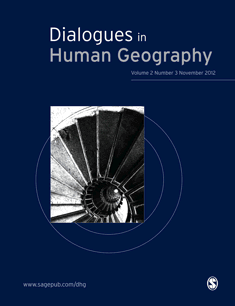
Dialogues in Human Geography
Scope & Guideline
Fostering Insightful Exchanges in Geography
Introduction
Aims and Scopes
- Critical Geographies:
The journal emphasizes critical geography, focusing on power dynamics, social justice, and the implications of geographic thought in contemporary society. - Interdisciplinary Approaches:
It promotes interdisciplinary scholarship that integrates insights from sociology, anthropology, political science, and cultural studies, fostering a broader understanding of geographic phenomena. - Innovative Methodologies:
The journal encourages the use of innovative methodologies, including qualitative, quantitative, and participatory approaches, to address complex geographic issues. - Engagement with Global South Perspectives:
There is a strong focus on perspectives from the Global South, reflecting on issues of coloniality, informality, and the implications of globalization in various contexts. - Theoretical Dialogues:
The journal engages in theoretical dialogues that critique and expand geographic thought, addressing themes such as postcolonialism, feminism, and queer theory. - Environmental and Ecological Considerations:
It explores the intersections of geography with environmental studies, particularly in the context of climate change, sustainability, and ecological justice.
Trending and Emerging
- Decolonial and Anti-Colonial Perspectives:
There is a growing emphasis on decolonial frameworks and anti-colonial perspectives, particularly in relation to geographic epistemologies that challenge Eurocentrism. - Affect and Emotional Geographies:
An increasing interest in affect and emotional geographies highlights how feelings and emotional responses shape spatial experiences and social relations. - Geographies of Care and Social Reproduction:
The journal is increasingly focusing on geographies of care, emphasizing the importance of social reproduction, relationality, and the politics of care in geographic research. - Environmental Justice and Climate Adaptation:
Research themes addressing environmental justice, climate change, and adaptive practices are becoming more central, reflecting urgent global challenges. - Digital Geographies and Data Politics:
Emerging discussions around digital geographies, data ethics, and the implications of technology on spatial practices represent a significant trend in the journal's recent publications. - Intersectionality in Geography:
There is a notable increase in studies incorporating intersectional analysis, exploring how various identities and social categories interact within geographic contexts.
Declining or Waning
- Traditional Urban Studies:
There seems to be a decline in traditional urban studies that emphasize static, conventional urban planning models. The journal is increasingly favoring dynamic, critical perspectives on urbanism. - Historical Geographies:
Themes centered around historical geography and the exploration of geographic history appear less frequently, as contemporary and future-oriented discussions gain traction. - Globalization in a Simplistic Framework:
The simplistic narratives of globalization are waning, with a shift towards more nuanced discussions that incorporate issues of power, resistance, and local contexts. - Descriptive Studies without Critical Analysis:
Papers that focus solely on descriptive geography, lacking critical engagement or theoretical depth, are becoming less common, as the journal seeks more analytical contributions. - Narrowly Defined Geographic Areas:
Research focused on narrowly defined geographic areas without broader implications or connections to global discourses is seeing decreased publication.
Similar Journals
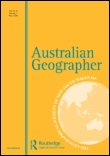
AUSTRALIAN GEOGRAPHER
Shaping the Future of Earth-Surface ResearchAUSTRALIAN GEOGRAPHER, published by Routledge Journals, Taylor & Francis Ltd, is a leading scholarly journal that captures the dynamic and multifaceted field of geography. With an ISSN of 0004-9182 and an E-ISSN of 1465-3311, this peer-reviewed journal has a long-standing tradition, dating back to its origins between 1928 and 1929, and is essential for those engaged in cutting-edge research in Earth-Surface Processes and Geography, Planning and Development. Recognized for its academic rigor, the journal holds a prestigious Q1 ranking in both Earth-Surface Processes and Geography categories as of 2023. Furthermore, its Scopus rankings underscore its influence, placing it in the top 30% of its field. Although it does not currently offer Open Access, AUSTRALIAN GEOGRAPHER remains a critical platform for presenting significant geographic research and fostering academic dialogue, making it indispensable for researchers, professionals, and students eager to contribute to the evolving landscape of geographic scholarship.
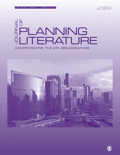
JOURNAL OF PLANNING LITERATURE
Advancing the Frontiers of Planning KnowledgeJOURNAL OF PLANNING LITERATURE, published by SAGE PUBLICATIONS INC, stands as a premier journal in the field of planning, geography, and development since its inception in 1985. With an impressive impact factor and a top-tier ranking in the Q1 category as per Scopus, it is a vital resource for researchers, professionals, and students committed to advancing the discipline. The journal's scope encompasses a wide array of topics related to planning literature, offering critical insights and fostering academic discourse that serves both theoretical and practical interests. Notably, it ranks #37 out of 821 in its category, positioning it in the 95th percentile for excellence. Although it does not currently offer Open Access options, the journal's rigorous peer-reviewed content and authoritative articles make it indispensable for anyone interested in the latest developments and trends in planning studies. With its commitment to high-quality research, JOURNAL OF PLANNING LITERATURE is dedicated to shaping the future of urban and regional planning research.

Annals of the American Association of Geographers
Navigating the Intersections of Geography and SocietyAnnals of the American Association of Geographers is a leading academic journal published by Routledge Journals, Taylor & Francis Ltd, and is based in the United Kingdom. With an impact factor positioning it in the Q1 category for both Earth-Surface Processes and Geography, Planning and Development, it stands as a pivotal resource for researchers and professionals in the fields of geography and environmental sciences. The journal’s broad scope accommodates a diverse range of topics, including spatial analysis, environmental change, and human geography, reflecting the dynamic nature of geographical research. Accessible in both print and digital formats, the journal encourages open dialogue and dissemination of knowledge among its authors, readers, and the academic community. As it converges through the years from 2016 to 2024, the Annals continues to showcase high-quality research that influences geographic thought and practice, making it essential reading for students, academics, and practitioners alike.

Geography Compass
Illuminating the Path of Geographical InquiryGeography Compass, published by WILEY, stands as a premier academic journal in the multidisciplinary realm of geography. Since its inception in 2008, Geography Compass has consistently provided an interactive platform for scholars and practitioners to present their findings and insights across various key areas, including Atmospheric Science, Earth-Surface Processes, and Water Science and Technology. This journal is distinguished by its Q1 rankings in several Scopus categories, reflecting its significance and influence in the field, with its position in the 92nd percentile for General Social Sciences attesting to its high regard among academic circles. Although it does not currently provide open access options, the journal caters to a broad audience through its rigorous peer-review process and comprehensive coverage of contemporary geographical issues. Researchers and professionals looking to engage with cutting-edge research will find Geography Compass an invaluable resource for advancing knowledge and fostering discussions in geography and related sciences.
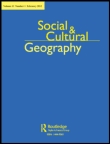
SOCIAL & CULTURAL GEOGRAPHY
Transforming understanding of societal relationships with space.SOCIAL & CULTURAL GEOGRAPHY, published by Routledge Journals, Taylor & Francis Ltd, stands as a leading platform for innovative research in the fields of cultural studies and geography. With an impressive impact factor reflected in its Q1 ranking in both Cultural Studies and Geography, Planning and Development categories, this journal houses high-quality articles and theoretical frameworks that shape contemporary discussions in social and cultural geography. Its rigorous indexing, including a commendable Scopus Rank—#20 out of 1304 in Cultural Studies—underscores its significance and influence in the academic community. Operating since 2000 and continuing to thrive until 2024, SOCIAL & CULTURAL GEOGRAPHY promotes interdisciplinary dialogues while fostering a deeper understanding of the intricate relationships between society and space. We encourage researchers, professionals, and students to engage with resourceful insights and critical perspectives published in this pivotal journal, thereby contributing to the evolving landscape of geographical thought.

Revista Geoaraguaia
Championing Academic Collaboration Across DisciplinesRevista Geoaraguaia, published by UNIV FEDERAL MATO GROSSO, is an esteemed open-access journal dedicated to advancing research in the field of human and social sciences. Based in Brazil, this journal facilitates scholarly communication and fosters interdisciplinary approaches, exploring topics that encompass geography, sociology, and environmental studies. Although specific metrics like H-Index and impact factor are not listed, the journal is committed to providing a platform for innovative research that addresses pressing societal challenges. Researchers, academics, and students will find a rich repository of articles that not only contribute to theoretical frameworks but also enhance practical applications in various settings. By connecting local and global issues, Revista Geoaraguaia plays a crucial role in promoting academic discourse and advancing knowledge in the vibrant landscape of Latin American studies.
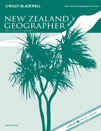
New Zealand Geographer
Innovating Perspectives on Geographic PhenomenaNew Zealand Geographer, published by WILEY, is a distinguished academic journal that has made significant contributions to the fields of geography, planning, and earth sciences since its inception in 1945. With a dedication to advancing knowledge through rigorous research and critical analysis, the journal encompasses a broad spectrum of topics relevant to both regional and global geographies. This journal is currently indexed in Scopus, achieving commendable rankings in multiple categories, including a Q3 status in both Earth and Planetary Sciences and Geography, Planning and Development for 2023, highlighting its relevance and standing within the academic community. Although it does not currently offer open access, its commitment to providing insightful and impactful content ensures that it remains a vital resource for researchers, professionals, and students alike seeking to deepen their understanding of geographical phenomena. The journal's ongoing publication until 2024 continues to foster scholarly discourse, making it an essential platform for innovative research in geographic studies.
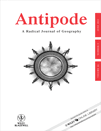
ANTIPODE
Navigating the Intersections of Planet and PeopleANTIPODE is a leading academic journal published by WILEY, renowned for its contributions to the fields of Earth-Surface Processes and Geography, Planning, and Development. With an impressive impact factor and ranked in the Q1 category for both Earth and Planetary Sciences and Social Sciences, it is a pivotal resource for researchers and professionals who seek to explore the complex interplay between social and environmental dynamics. Since its inception in 1969, ANTIPODE has provided a platform for innovative and critical scholarship, fostering discussions that drive forward-thinking research in its domain. The journal's rich history continues into 2024, as it remains committed to publishing high-quality, peer-reviewed articles that challenge norms and inspire further research. Researchers, professionals, and students will find in ANTIPODE not only a journal but a community dedicated to advancing knowledge and practice in geography and development studies.
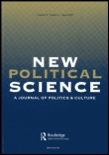
New Political Science
Elevating voices in contemporary political dialogue.New Political Science is a premier academic journal published by Routledge Journals, Taylor & Francis Ltd, dedicated to the exploration of contemporary issues in political science and sociology. With its ISSN 0739-3148 and E-ISSN 1469-9931, this journal has been a significant voice in the field since its inception in 1979, providing a platform for rigorous scholarly discussion and innovative research. Its scope encompasses critical analyses of political phenomena, offering insights that are particularly relevant in today's socio-political climate. As part of the Q3 category in Sociology and Political Science, its impact is underscored by a Scopus rank of #837 out of 1466, placing it within the 42nd percentile among peer journals. Though not open access, the journal remains committed to disseminating high-quality research to its audience, thereby enhancing understanding and fostering dialogue on key political issues globally. With a convergence of years extending from 1979 to 1986 and from 1989 to 2024, New Political Science continues to serve as an essential resource for researchers, professionals, and students alike, ensuring that critical political discourse thrives.

Southeastern Geographer
Fostering Innovative Research in Geography and PlanningThe Southeastern Geographer is a prominent academic journal published by the Association of American Geographers, dedicated to advancing knowledge in the fields of Earth and Planetary Sciences and Geography, Planning and Development. With an ISSN of 0038-366X and an E-ISSN of 1549-6929, this journal has been a staple in geographical scholarship since its inception, offering a platform for diverse research that spans over four decades, specifically from 1979 to 1994 and then from 1996 to 2024. The journal is currently classified in the Q3 category within its fields, indicating its significant influence in shaping contemporary geographical discourse. Researchers, professionals, and students alike benefit from its rigorously peer-reviewed articles that explore regional studies, environmental issues, and sociocultural dynamics, making it essential for anyone interested in the interconnectedness of geography and society. As a vital resource for advancing geographical education and research, the Southeastern Geographer continues to engage its audience with innovative insights and scholarly contributions.